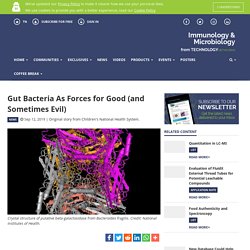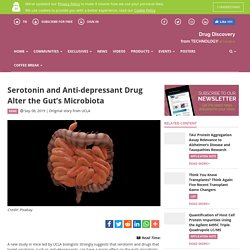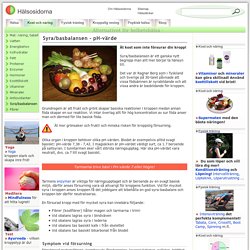

Log into Facebook. Gut Bacteria As Forces for Good (and Sometimes Evil) Back in 2015, an interdisciplinary group of research scientists made their case during a business pitch competition: They want to create a subscription-based service, much like 23andMe, through which people could send in samples for detailed analyses.

The researchers would crunch that big data fast, using a speedy algorithm, and would send the consumer a detailed report. But rather than ancestry testing via cheek swab, the team sought to determine the plethora of diverse bacterial species that reside inside an individual’s gut in their ultimate aim to improve public health. Hiroki Morizono, Ph.D., a member of that team, contributed detailed knowledge of Bacteroides, a key organism amid the diverse array of bacterial species that co-exist with humans, living inside our guts. Another Study Suggests That Humans Are Not ‘Designed’ To Eat Meat. The Facts:A recent study conducted by researchers in California and France found that meat protein is associated with a very sharp increased risk of heart disease, while protein from nuts and seeds is actually beneficial for the human heart.Reflect On:There are multiple studies linking consumption of animal products to several diseases, and plant foods to the reversal and prevention of them.

Does this suggest our biology is not designed to eat animal products? Are humans supposed to eat meat and consume animal products? If you look into it, you may be surprised. Take milk, for example. The majority of people on the planet are lactose intolerant for a reason. The reason why I have a hard time believing that humans are meant to consume meat and animal products is because there’s so much science proving this. It was published in the International Journal of Epidemiology. 81,000 participants were analyzed for this study. The study concluded that: The Gut Microbiome and Health Collection. Serotonin and Anti-depressant Drug Alter the Gut’s Microbiota.
A new study in mice led by UCLA biologists strongly suggests that serotonin and drugs that target serotonin, such as anti-depressants, can have a major effect on the gut’s microbiota — the 100 trillion or so bacteria and other microbes that live in the human body’s intestines.

Serotonin — a neurotransmitter, or chemical messenger that sends messages among cells — serves many functions in the human body, including playing a role in emotions and happiness. An estimated 90% of the body’s serotonin is produced in the gut, where it influences gut immunity. The team — led by senior author Elaine Hsiao and lead author Thomas Fung, a postdoctoral fellow — identified a specific gut bacterium that can detect and transport serotonin into bacterial cells. When mice were given the antidepressant fluoxetine, or Prozac, the biologists found this reduced the transport of serotonin into their cells. This bacterium, about which little is known, is called Turicibacter sanguinis. Reference: Fung, et al.
Oto najlepszy sposób na odrobaczanie - syrop z orzecha włoskiego. Orzech włoski już od starożytności cieszył się powodzeniem zarówno jako roślina kulinarna oraz medyczna.

Ma szerokie zastosowanie w medycynie naturalnej, jest to spowodowane tym iż orzech produkuje naturalne herbicydy, które nie pozwalają na wzrost żadnych roślin (nawet własnych siewek) u swojego podnóża. To dzięki nim skutecznie walczy z grzybami, bakteriami, pasożytami i drożdżami w układzie pokarmowym. Odtruwający orzech włoski Jego właściwości odtruwające i oczyszczające świetnie sprawdzają się w problemach z układem pokarmowym, niestrawności, owrzodzeniu, cukrzycy, czy w bolesnych wzdęciach brzucha.
Orzech włoski nie dość, że walczy z problemami układu trawiennego to równocześnie wspiera go poprzez poprawianie możliwości przyswajania składników odżywczych, takich jak proteiny i kwasy tłuszczowe oraz uniemożliwia wchłanianie toksyn, co może mieć miejsce podczas zaparć. How Your Gut Bacteria May Be Controlling Your Brain. After century of removing appendixes, docs find antibiotics can be enough. Syra/basbalansen - pH-värde. Grundregeln är att frukt och grönt skapar basiska reaktioner i kroppen medan annan föda skapar en sur reaktion.

Vi intar överlag allt för hög koncentration av sur föda anser man och därmed för lite basisk föda. Olika organ i kroppen behöver olika pH-värden. Blodet är exempelvis alltid svagt basiskt: pH-värde 7,38 - 7,42. I magsäcken är pH-värdet väldigt surt, ca 1.7 beroende på saltsyran. I tunntarmen sker vårt största näringsupptag. Tarmens enzymer är viktiga för näringsupptaget och är beroende av en svagt basisk miljö, därför anses försurning vara så allvarigt för kroppens funktion.
En försurad kropp med för mycket syra kan innebära följande: Fibrer (kostfibrer) håller magen och tarmarna i trim! Symptom vid försurning.